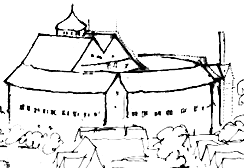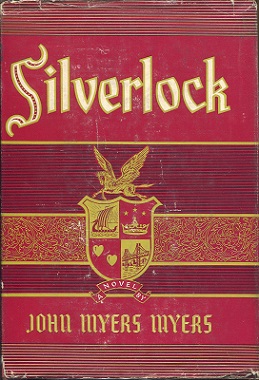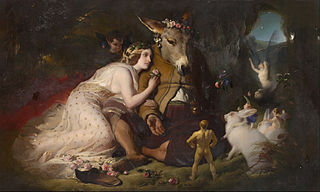
A Midsummer Night's Dream is a comedy written by William Shakespeare c. 1595 or 1596. The play is set in Athens, and consists of several subplots that revolve around the marriage of Theseus and Hippolyta. One subplot involves a conflict among four Athenian lovers. Another follows a group of six amateur actors rehearsing the play which they are to perform before the wedding. Both groups find themselves in a forest inhabited by fairies who manipulate the humans and are engaged in their own domestic intrigue. The play is one of Shakespeare's most popular and is widely performed.

Puck, or Robin Goodfellow, is a character in William Shakespeare's play, A Midsummer Night's Dream.

William Kempe, commonly referred to as Will Kemp, was an English actor and dancer specialising in comic roles and best known for having been one of the original stage actors in early dramas by William Shakespeare. Roles associated with his name may include the great comic creation, Falstaff, and his contemporaries considered him the successor to the great clown of the previous generation, Richard Tarlton.

Richard Burbage was an English stage actor, widely considered to have been one of the most famous actors of the Globe Theatre and of his time. In addition to being a stage actor, he was also a theatre owner, entrepreneur, and painter. He was the younger brother of Cuthbert Burbage. They were both actors in drama. Burbage was a business associate and friend to William Shakespeare.

The Globe Theatre was a theatre in London associated with William Shakespeare. It was built in 1599 at Southwark, close to the south bank of the Thames, by Shakespeare's playing company, the Lord Chamberlain's Men. It was destroyed by fire on 29 June 1613. A second Globe Theatre was built on the same site by June 1614 and stayed open until the London theatre closures of 1642. As well as plays by Shakespeare, early works by Ben Jonson, Thomas Dekker and John Fletcher were first performed here.

The Theatre was an Elizabethan playhouse in Shoreditch, just outside the City of London. It was the first permanent theatre ever built in England. It was built in 1576 after the Red Lion, and the first successful one. Built by actor-manager James Burbage, near the family home in Holywell Street, The Theatre is considered the first theatre built in London for the sole purpose of theatrical productions. The Theatre's history includes a number of important acting troupes including the Lord Chamberlain's Men, which employed Shakespeare as actor and playwright. After a dispute with the landlord, the theatre was dismantled and the timbers used in the construction of the Globe Theatre on Bankside.

Silverlock is a novel by John Myers Myers published in 1949. The novel's settings and characters, aside from the protagonist, are all drawn from history, mythology, and other works of literature.
The King's Men was the acting company to which William Shakespeare (1564–1616) belonged for most of his career. Formerly known as the Lord Chamberlain's Men during the reign of Queen Elizabeth I, they became the King's Men in 1603 when King James I ascended the throne and became the company's patron.
John Heminges was an actor in the King's Men, the playing company for which William Shakespeare wrote. Along with Henry Condell, he was an editor of the First Folio, the collected plays of Shakespeare, published in 1623. He was also the financial manager for the King's Men.
The Lord Chamberlain's Men was a company of actors, or a "playing company", for which Shakespeare wrote during most of his career. Richard Burbage played most of the lead roles, including Hamlet, Othello, King Lear, and Macbeth. Formed at the end of a period of flux in the theatrical world of London, it had become, by 1603, one of the two leading companies of the city and was subsequently patronized by James I.

Nick Bottom is a character in Shakespeare's A Midsummer Night's Dream who provides comic relief throughout the play. A weaver by trade, he is famously known for getting his head transformed into that of a donkey by the elusive Puck. Bottom and Puck are the only two characters who converse with and progress the three central stories in the whole play. Puck is first introduced in the fairies' story and creates the drama of the lovers' story by messing up who loves whom, and places the donkey head on Bottom's in his story. Similarly, Bottom is performing in a play in his story intending it to be presented in the lovers' story, as well as interacting with Titania in the fairies' story.

Joseph Marcell is a British actor and comedian. He is best known for his role as Geoffrey Butler, the butler on the NBC sitcom The Fresh Prince of Bel-Air from September 1990 until the show ended in May 1996.

Shakespeare's plays are a canon of approximately 39 dramatic works written by English poet, playwright, and actor William Shakespeare. The exact number of plays—as well as their classifications as tragedy, history, comedy, or otherwise—is a matter of scholarly debate. Shakespeare's plays are widely regarded as being among the greatest in the English language and are continually performed around the world. The plays have been translated into every major living language.

The Shakespearean fool is a recurring character type in the works of William Shakespeare.

Thousands of performances of William Shakespeare's plays have been staged since the end of the 16th century. While Shakespeare was alive, many of his greatest plays were performed by the Lord Chamberlain's Men and King's Men acting companies at the Globe and Blackfriars Theatres. Among the actors of these original performances were Richard Burbage, Richard Cowley, and William Kempe.
John Underwood was an early 17th-century actor, a member of the King's Men, the theatrics company of William Shakespeare.

The Dark Lady Players is a New York-based Shakespeare company who perform what they regard as the religious allegories in the Shakespearean plays. In 2007, they performed an allegorical production of A Midsummer Night's Dream at the Abingdon Theater in New York. In 2008, they performed As You Like It: The Big Flush, directed by Stephen Wisker, at the Midtown International Theatre Festival with an entirely female cast interspersing Shakespeare's As You Like It with "cultural and literary references" believed to be included by Emilia Bassano Lanier. On December 15, 2009, they produced a festival at Manhattan Theater Source of short plays written about Lanier by nine New York City playwrights. In September 2011, they presented "nine scenes from Shakespeare, divided into three thematic groups and casts" in the West-Park Presbyterian Church in Upper West Side.
The Ian Charleson Awards are theatrical awards that reward the best classical stage performances in Britain by actors under age 30. The awards are named in memory of the renowned British actor Ian Charleson, and are run by the Sunday Times newspaper and the National Theatre. The awards were established in 1990 after Charleson's death, and have been awarded annually since then. Sunday Times theatre critic John Peter (1938–2020) initiated the creation of the awards, particularly in memory of Charleson's extraordinary Hamlet, which he had performed shortly before his death. Recipients receive a cash prize, as do runners-up and third-place winners.
Demetrius is one of the lovers in William Shakespeare's play A Midsummer Night’s Dream. He is a young man who is engaged to a young woman, Hermia, who is in love with Lysander.

Pop-up Globe was a New Zealand theatre production company, based in Auckland, New Zealand. It produced Jacobean theatre, particularly the works of Shakespeare, in specially-built temporary replicas of the second Globe, the theatre Shakespeare and his company built and used. The company’s theatre is the world's first full-scale reconstruction of the Second Globe Theatre (1614–44).












